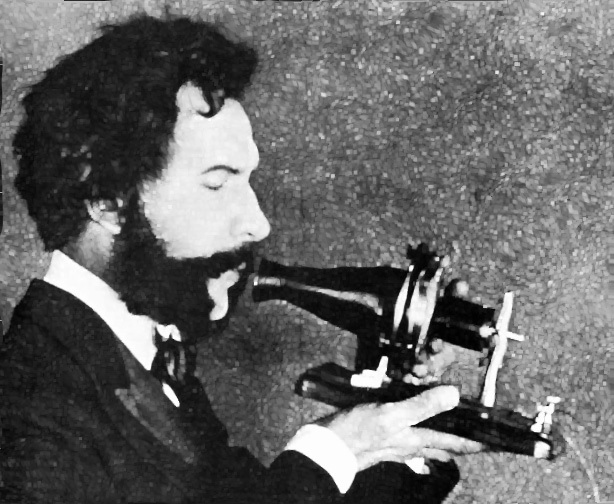Telecom Informer
by The Prophet
Hello, and greetings from the Central Office!
As winter thaws into spring, I'm writing this column as I prepare for a trip to my first subcontinent - India! A topic for a future column, we're closing our call center in India and I'm heading there to wind it down. There is some incredible new technology that allows us to bring call centers back onshore with a lower total cost (and higher customer satisfaction) versus offshore. But before I jump on yet another plane, here's what I was up to over the winter. Another quarter has taken me to another two continents, this time Europe and Asia. In fact, I was back and forth between Europe and Asia a few times each day at one point. How? By crossing over the Bosphorus, a strait which bisects Istanbul and separates Europe and Asia. As this was my first visit to Turkey, a country of 75 million people bridging Europe and Asia, I was obviously interested in what I could learn about telecommunications there.
The weather in Istanbul was awful - sideways sleet - so I had the perfect opportunity to enjoy a "phone trip." I used to pay a lot of attention to payphones when I traveled, but I quickly gave up in Turkey. As in the U.S., most of the payphones that I saw were either vandalized or out of order (although you will find the occasional working one). At no point did I see anyone actually using them, either. It seems that this is an increasingly common condition. Payphones are still scrupulously maintained and meticulously cleaned in Japan, but in developed countries, it's increasingly rare to find working payphones. Developing countries still do a brisk business in public phones, but most of these aren't payphones. Instead, most public phones are in Internet cafes and calling shops. I saw an Internet cafe in Istanbul offering calling services to the public, but only one. Public phones just don't seem to be very popular in Istanbul - at least in the parts of the city I visited.
The lack of public calling services was somewhat surprising given the very high cost of mobile phones in Turkey. One of my first stops when getting off a plane in a new country is at a mobile phone kiosk or vending machine. It's so common to change SIM cards when you change countries in Europe and Asia that there is almost always a convenient place to buy a SIM card at the airport. Istanbul is no exception. I flew into Sabiha Gökçen airport, and there is a Vodafone kiosk just outside the baggage claim. I stopped by and asked how much a SIM card cost, and was quoted an outrageous sum - the equivalent of about $75 US! I was incredulous, and asked whether that was just for the SIM card or whether it included service. A month of service was, in fact, included, but it was nothing to write home about - an hour or so of local calls, and 500 MB of data service. The Vodafone representative assured me that this was price competitive with other providers in the area, and when I asked why it was so expensive, he gave me a blank look and what I eventually dubbed the "Turkish shrug." This is because in Turkey, people often don't ask why, know why, or want to know why; instead, they just give you a blank stare and a disinterested shrug.
Obviously, paying $75 for a SIM card wasn't going to work for me (I was only staying for three days), but I was curious why it was so expensive. As it turns out, in Turkey, there is a high tax on mobile phones. These are registered with a local tax agency and the IMSI (a unique code that identifies your equipment) is registered with the Turkish tax authorities. All mobile phone providers are required to validate that your phone's IMSI exists in the tax authority's database before allowing you to connect to the network using a local SIM card. Vodafone actually handles this process for you if you buy a SIM card at the airport (and the cost is included in the SIM card), but otherwise, you have to fill out forms in Turkish and take them to a government office in Istanbul along with your tax payment. Only then are you allowed access to the Turkish mobile network on a local SIM card. While it is possible to roam, roaming charges can be very expensive in Turkey. Using my Dutch SIM card, local calls cost over three euro per minute in Istanbul, and SMS messages were 85 euro cents each.
"Fine, I'll just use Wi-Fi," I thought. Unfortunately, when I arrived at the hotel, I discovered another reality of connectivity in Turkey: the Internet is censored. It's not censored to the degree of China, but it's cranked up a notch above Thailand. Many sites I routinely visit were blocked - things like Reddit, Gawker, and even technical publications (although 2600.com was not blocked). While I was told that Internet blocking isn't as extensive as it was during the Gezi Park protests (where Twitter, along with many other social media sites, was blocked), a lot of the blocks implemented during this time never went away.
Normally I can get around these problems with a VPN, but the hotel Wi-Fi blocked these! So, in searching around for a solution, I discovered that it's possible to rent a mobile wireless hotspot in Istanbul. This is a business model that I haven't seen anywhere else in the world, but is necessary because of the massive headaches Turkish authorities impose on foreign mobile phone users. Cello Mobile and AllDayWifi offer this service, so I rented a hotspot from AllDayWifi. It cost about $7 per day, was delivered to my hotel, and came with unlimited data service. This ultimately solved both problems because my VPN then worked, and I was able to bring data service along with me (so I could use Google Maps, etc. on my Android phone).
When I rented the mobile hotspot, I was surprised to discover inconsistencies between what is blocked depending on which network is in use. The mobile hotspot I rented used the network of the smallest mobile phone provider in Turkey, Avea (the other two are Vodafone and Turkcell). At the hotel, the service was provided by Türk Telecom, the incumbent wireline provider. The differences appear to be because of how censorship is performed in Turkey. Rather than operating a firewall itself (like the Chinese government does), the Turkish government puts blocking responsibility onto Internet providers. This means that blocking can be a very blunt instrument if poorly implemented. Türk Telecom appears to block an entire website if any individual thing on it is required to be blocked, while Avea blocks just the individual page with content the government finds objectionable. So, although my VPN worked correctly, I found myself not needing to actually use it when connected to the Avea hotspot (apparently the stuff I read isn't anything the Turkish government wants to block).
I was interested to know what mobile phones Turkish people prefer, and what they do with them. The most popular mobile phone operating system in Turkey is Android, with an overwhelming preference for sleek, high-end, and aspirational models from Samsung. Phones in Turkey are sold unlocked, making a high-end mobile phone a substantial upfront investment for Turkish people and lessening the popularity of more expensive iOS phones. The app ecosystem is largely what you see in other European countries, but Turkish people love local music and entertainment apps. One guy showed me his phone with over a dozen of these installed. Given their shared language with other countries in the region, not all of these are Turkish-based. One music download app popular in Turkey is based in Azerbaijan for, I was told, "copyright reasons."
And with that, I'm hearing the final boarding call for my flight to Dubai, with onward service to Mumbai. Have an incredible spring and I'll write to you again this summer!

